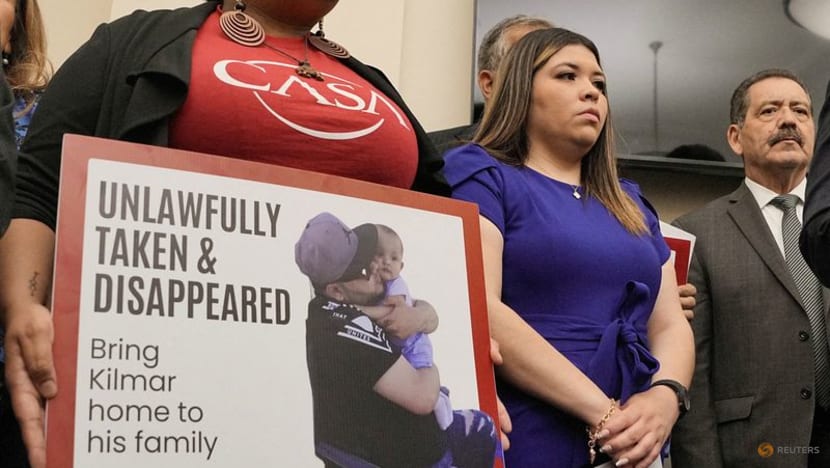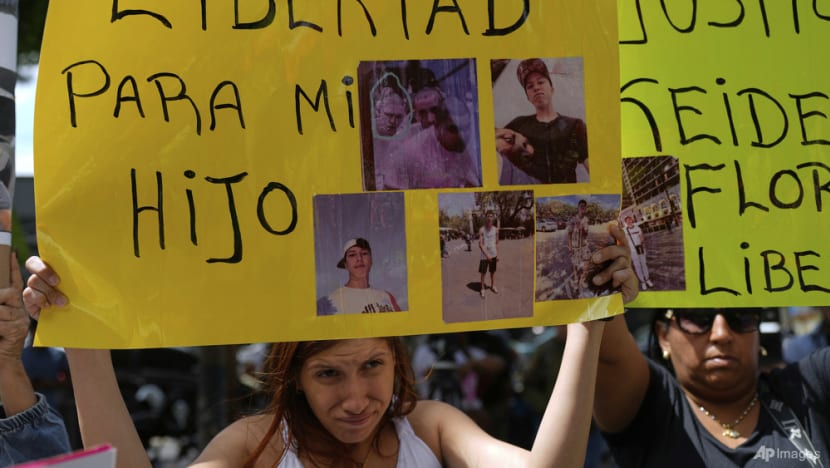US Supreme Court temporarily halts deportations of Venezuelan migrants under wartime law

Jennifer Vasquez Sura, wife of Kilmar Abrego Garcia, a Salvadoran migrant who lived in the US legally with a work permit and was erroneously deported to El Salvador, looks on during a press conference with other family members, supporters and members of the Congressional Hispanic Caucus, in Washington, Apr 9, 2025. (File photo: Reuters/Ken Cedeno)
WASHINGTON: The US Supreme Court on Saturday (Apr 19) temporarily barred the Trump administration from deporting a group of Venezuelan migrants it accused of being gang members under a rarely used wartime law, prompting the White House to predict that it will ultimately win the legal battle.
The court issued the order after the men's lawyers asked it to intervene on an emergency basis, saying they faced imminent deportation without the judicial review the justices previously ordered.
The White House responded that President Donald Trump would stay the course in his immigration crackdown but stopped short of saying the administration would defy the Supreme Court, appearing for now to avert a potential constitutional crisis between coequal branches of government.
"The Government is directed not to remove any member of the putative class of detainees from the United States until further order of this Court," the justices said in a brief, unsigned decision.
Conservative Justices Clarence Thomas and Samuel Alito publicly dissented from the decision, issued around 12.55am (12.55pm, Singapore time).
It was not immediately clear how many Venezuelans faced deportation or the location to which they would be sent.
The Trump administration already has deported to a maximum-security prison in El Salvador more than 200 Venezuelan and Salvadoran men it claims are gang members.
The deportees included Kilmar Abrego Garcia, a Salvadoran immigrant who the administration admitted was removed by mistake, igniting an outcry over its immigration policy.
Many of the migrants' lawyers and family members say they were not gang members and had no chance to dispute the government's assertion that they were.
"We are confident in the lawfulness of the Administration's actions and in ultimately prevailing against an onslaught of meritless litigation brought by radical activists who care more about the rights of terrorist aliens than those of the American people," White House Press Secretary Karoline Leavitt said in a statement.
The case has raised questions about whether Trump, who has shown a willingness at times to defy court decisions since returning to office on Jan 20, will comply with limits set by the nation's highest court.
The high court majority issued Saturday's stay after American Civil Liberties Union lawyers filed urgent requests for immediate action in multiple courts, including the Supreme Court, after reporting that some of the men already had been loaded aboard buses and were told they were to be deported.
The ACLU said the administration was poised to deport the men using a 1798 law that historically has been employed only in wartime without affording them a realistic opportunity to contest their removal, as the Supreme Court had ordered.
“These men were in imminent danger of spending their lives in a horrific foreign prison without ever having had a chance to go to court. We are relieved that the Supreme Court has not permitted the administration to whisk them away the way others were just last month," Lee Gelernt, the ACLU's lead attorney in the case, said in a statement on Saturday.
In an audio recording posted on TikTok, several men said they were Venezuelans falsely accused of being gang members and held at Bluebonnet immigration detention center in Texas. They said they were taken to a regional airport late on Friday but then returned.
The recording has not been verified by Reuters. An earlier post on TikTok from the same account was cited in court filings on Friday.
More than 50 Venezuelans had been scheduled to be flown out of the country, presumably to El Salvador, from the immigration center, the New York Times cited two people with knowledge of the situation as saying.
Elected last year on a promise to crack down on migrants, Trump invoked the 1798 Alien Enemies Act in an attempt to swiftly deport accused members of Tren de Aragua, a criminal gang originating from Venezuelan prisons that his administration labels a terrorist group.

Trump and his senior aides have asserted their executive power grants them wide authority on immigration matters, testing the balance of power between branches of government.
COURT BATTLES
During a hearing on Friday, a government lawyer said in a related case that he was unaware of plans by the Department of Homeland Security to deport the men on Friday but there could be deportations on Saturday.
Trump scored one victory on Friday when an appeals court put on hold a threat by District Judge James Boasberg of contempt charges.
Boasberg also denied an ACLU request to block Trump from deporting suspected members of Tren de Aragua, citing an Apr 7 Supreme Court ruling that allowed Trump to use the Alien Enemies Act, albeit with certain limits.
Boasberg said he was concerned the government would deport additional people as soon as Saturday but that, "At this point I just don't think I have the power to do anything about it."
Trump previously called for Boasberg's impeachment following an adverse ruling, prompting a rare rebuke from US Chief Justice John Roberts.
While one hearing played out in Boasberg's court, the ACLU worked on a separate track to halt the deportations of Venezuelans held in Texas.
ACLU lawyers filed with the Supreme Court after failing to get a rapid response from earlier filings on Friday before US District Judge James Hendrix in Abilene, Texas, and the Fifth US Circuit Court of Appeals in New Orleans to block any such deportations.
In Saturday's order, the Supreme Court invited the administration to file a response to the ACLU's request after the 5th Circuit acts.
At issue is whether the Trump administration has met the Supreme Court's standard for providing the detainees due process before sending them to another country, possibly to the notorious prison in El Salvador where others are jailed.
HABEAS CORPUS RELIEF
Their deportation would be the first since the Supreme Court's 5-4 ruling that allowed removals under the 1798 law while specifying that "the notice must be afforded within a reasonable time and in such a manner as will allow them to actually seek habeas relief in the proper venue before such removal occurs".
Habeas corpus relief refers to the right of detainees to challenge the legality of their detention. It is considered a bedrock right under US law.
The Supreme Court did not indicate how much notice should be provided. Lawyers around the country have asked that the migrants be given 30 days' notice to allow them to contest their deportations.
Asked about the planned deportations on Friday, Trump said he was unfamiliar with the particular case but added: "If they're bad people, I would certainly authorize it."
"That's why I was elected. A judge wasn't elected," he told reporters at the White House.
Defense lawyers and Democrats in Congress have pressed the administration to demonstrate how it knows the Venezuelans are members of the gang, which is active in human trafficking and other crimes in South America but has a smaller US presence.
"We are not going to reveal the details of counter terrorism operations, but we are complying with the Supreme Court's ruling," Assistant Secretary for US Homeland Security Tricia McLaughlin said in a statement on Friday.















